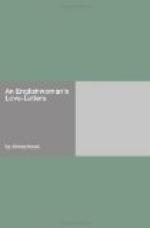LETTER XLVI.
Dearest: To-day I came upon a strange spectacle: poor old Nan-nan weeping for wounded pride in me. I found her stitching at raiment of needlework that is to be mine (piles of it have been through her fingers since the word first went out; for her love asserts that I am to go all home-made from my old home to my new one—wherever that may be!). And she was weeping because, as I slowly got to understand, from one particular quarter too little attention had been paid to me:—the kow-tow of a ceremonious reception into my new status had not been deep enough to make amends to her heart for its partial loss of me.
Her deferential recognition of the change which is coming is pathetic and full of etiquette; it is at once so jealous and so unselfish. Because her sense of the proprieties will not allow her to do so much longer, she comes up to my room and makes opportunity to scold me over quite slight things:—and there I am, meeker under her than I would be to any relative. So to-day I had to bear a statement of your mother’s infirmities rigorously outlined in a way I could only pretend to be deaf to until she had done. Then I said, “Nan-nan, go and say your prayers!” And as she stuck her heels down and refused to go, there I left the poor thing, not to prayer, I fear, but to desolate weeping, in which love and pride will get more firmly entangled together than ever.
I know when I go up to my room next I shall find fresh flowers put upon my table: but the grievous old dear will be carrying a sore heart that I cannot comfort by any words. I cannot convince her that I am not hiding in myself any wounds such as she feels on my behalf.
I write this, dearest, as an indirect answer to yours,—which is but Nan-nan’s woe writ large. If I could persuade your two dear and very different heads how very slightly wounded I am by a thing which a little waiting will bring right, I could give it even less thought than I do. Are you keeping the truce in spirit when you disturb yourself like this? Trust me, Beloved, always to be candid: I will complain to you when I feel in need of comfort. Be comforted yourself, meanwhile, and don’t shape ghosts of grief which never do a goose-step over me! Ah well, well, if there is a way to love you better than I do now, only show it me! Meantime, think of me as your most contented and happy-go-loving.
LETTER XLVII.
Dearest: I am haunted by a line of quotation, and cannot think where it comes from:
“Now sets the year in roaring gray.”
Can you help me to what follows? If it is a true poem it ought now to be able to sing itself to me at large from an outer world which at this moment is all gray and roaring. To-day the year is bowing itself out tempestuously, as if angry at having to go. Dear golden year! I am sorry to see its face so changed and withering: it has held so much for us both. Yet I am feeling vigorous and quite like spring. All the seasons have their marches, with buffetings and border-forays: this is an autumn march-wind; before long I shall be out into it, and up the hill to look over at your territory and you being swept and garnished for the seven devils of winter.




